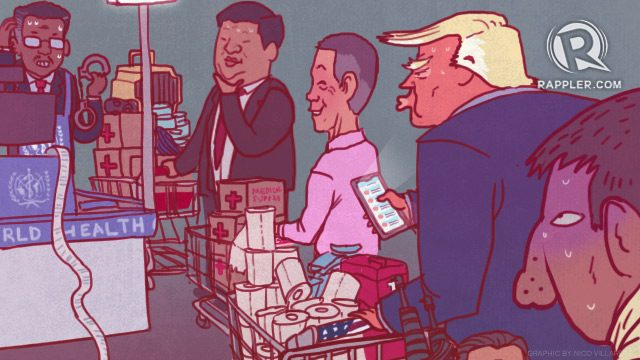SUMMARY
This is AI generated summarization, which may have errors. For context, always refer to the full article.
![[EDITORIAL] A wounded society faces a pandemic](https://www.rappler.com/tachyon/r3-assets/13E14EC0100441289FDEA74AD39D499B/img/6E3B5D90A2134D9CA0DE69956A92CF11/animated-coronavirus-lockdown-and-response.gif)
This morning, we woke up to humongous traffic in the entry points to Metro Manila. But the scariest part is that our rate of contagion has exponentially increased from 10 to 140 affected in just 7 days.
People mostly grin and bear it. Like the proverbial bamboo in the wind, we Filipinos, famous for our ability to adjust, are already bending.
But survival is not just about bending; it’s about mitigation. Sadly, it seems mitigation is not in our government’s skill set.
The Philippines had a headstart in the same way the West did. The pandemic threat of the coronavirus was evident way back in January, and we had enough time to prepare for what now looks like a scramble for a structure, a policy, and an operations plan.
All the best and worst practices are there for us to either follow or discard. Asia is said to have the best models – from China to Singapore to Hong Kong and Taiwan – while the West – from Italy to Spain to Iran to the United States were mostly caught unprepared. For this pandemic, China instituted draconian measures, while Singapore acted fast. Taiwan was thorough in contact-tracing. Are we learning anything from them?
This is our second pandemic in our lifetime, the first one being the H1N1 virus in 2009. Under then-health secretary Manuel Dayrit, the Philippines was recognized as a government model in dealing with SARS. That’s where we were before – proof that we have the best minds to deal with this.
Government crisis structures have been in place since SARS and the major disasters that have hit us. It is a matter of mobilizing the bureaucracy with clear goals and tapping the wisdom, experience, and agility of both our crisis veterans and new-generation local executives.
Post-2019 elections gave us some of the best mayors in Metro Manila and other urbanized areas, for example. Were their inputs gathered early enough to avoid a rushed lockdown or quarantine or whatever-we-call-it policy? (Read: The flawed economics of Duterte’s partial Metro Manila lockdown)

Every crisis draws the collective spirit from a community – and demands leadership. Unfortunately, the last 3 years have also deepened our divisions as a society under a leader who has chosen to lead by fear.
In a polarized society governed by a polarizing leader – collective effort, single-mindedness, and the sense of community do not immediately surface.
This is the big lesson this crisis has to offer: A leader must embrace his role as a unifying force, because a wounded society is a weak society in the face of a pandemic.
We have the strongest president in this part of the world who, on his mere say so, had mobilized the law enforcers, the lawmakers, the judiciary, and the bureaucracy to follow his wishes. But what did we hear in his nationwide address last week? The President could barely articulate national policy, leaving the public more confused and anxious – and his own underlings issuing conflicting orders.
And that’s the crux of the matter: pandemic politics. Used to black-and-white and parochial orders, the Duterte administration is grappling with how to navigate the complex details and concerns that this crisis is surfacing. Between public interest and politics. Between business concerns and citizens’ health. Between local autonomy and state power. Between draconian measures and sophisticated ones. Between unpopular decisions and posturing for 2022.
So what are we going to do about it?
We can curse our luck or we can start coming together and putting that mythical bayanihan spirit to work.
We can blame our leaders or put pressure on them to perform better. We can honk our symbolic online horns and stop giving this government a free pass.
We can flex our muscles as private entities to raise funds for much-needed hygiene kits and fast-track long-awaited test kits to be available like drive-through french fries.
We can stop hoarding and creating a false shortage and depriving our poorer kababayan of the same goods. We can heed common-sense and health advisories that say we should stay at home and practice social distancing.
By doing this, we spread hope. And hope is our most precious currency now.
Rappler CEO Maria Ressa writes in her newsletter: “Hope comes from courage, from so many.”
- the courage of our health workers, who are doing their jobs, many without the right protective gear;
- the courage of our government officials and employees, who are trying to find the best path forward despite top-down shortcuts and knee-jerk commands;
- the courage of our journalists who go out every day to find information so you don’t have to;
- the courage of ordinary Filipinos who keep on doing what they must despite the uncertainty of the times.
Leave the politics behind. Let us not be handicapped by our wounds. #CourageOn. – Rappler.com
Add a comment
How does this make you feel?





There are no comments yet. Add your comment to start the conversation.